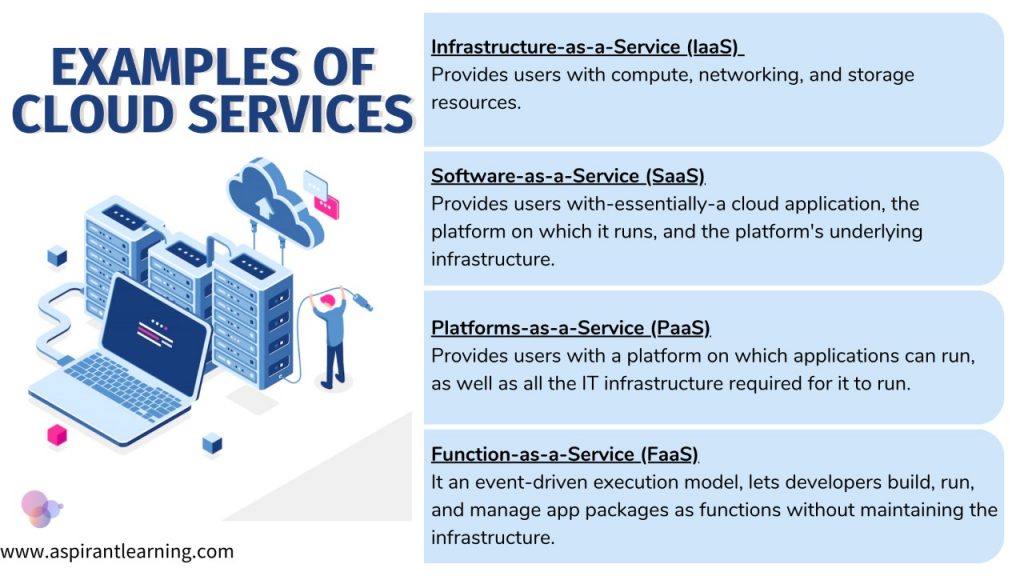News Highlight
Cloud services allow startups to access cloud computing, data storage and hosting, compressing a startup’s lifecycle and spurring innovation by letting it simulate experiments in the cloud.
Key Takeaway
- Over the last five years, the number of registered startups in India has grown from 452 in 2016 to 84,012, according to figures presented in Parliament this week.
- While they span a variety of industries from financial tech, gaming and health tech, several are based in the cloud.
- In addition, the servers and data storage is accessible via the internet, and data-storage companies offer a slew of incentives to draw and retain them on their platforms.
- AWS, or Amazon Web Services, one of India’s largest providers of cloud-based services, has provided start-up credits that allow aspirant startups to use a suite of services from computing, storage and hosting for free.
Cloud Services
- About
- Infrastructure, platforms, or software in the cloud is hosted by a third party and made accessible to customers online.
- In addition, Cloud services make it easier for user data to move from front-end clients (such as servers on users’ ends, tablets, desktops, and laptops) across the internet to the provider’s systems and back again.
- The development of cloud-native apps and the adaptability of working in the cloud are promoted by cloud services.
- Users only need a computer, an operating system, and an internet connection to utilise cloud services.
Cloud infrastructure
- Providers of cloud services separate computational power from hardware parts when offering users a cloud architecture, for example, by separating:
- Processing power from central processing units (CPUs).
- Dynamic memory from random access memory (RAM) chips.
- In addition, graphics processing from the graphics processing units (GPUs).
- Data storage availability from data centres or hard drives.
- Furthermore, this abstraction is often achieved by using virtualisation and virtual machines.
- After being separated, the storage, computing, and networking parts are made available to consumers as infrastructure, or IaaS, through the internet.
- Cloud storage, which is used to store massive data as part of the Internet of Things, has become more popular due to this cloud service (IoT).
- Finally, an example of an IaaS provider is RackSpace.
India’s Cloud Computing Market
- In addition, rising investment in the development of cloud data centres is anticipated to expand the Indian cloud computing market.
- The industry is now being driven primarily by the high concentration and expanding number of small and medium-sized businesses in India, quickly converting to cloud computing.

Significant Challenges Related to Start-ups in India
- Lack of Forward Thrust to Innovation
- Students in India’s educational system are prevented from pursuing innovation due to a lack of practical training and industrial exposure.
- Additionally, this causes a research and development gap in the higher education system in India.
- Lack of Recognition
- Since about 70% of Indians still don’t have reliable access to the internet in rural areas.
- As a result, many village-based start-ups are overlooked and denied access to government funding programmes.
- Bootstrapped Nature
- Firstly, a considerable quantity of working money is needed to run a start-up.
- Since domestic financing is scarce, many start-ups in India, particularly those in their early stages, are bootstrapped or self-funded using the founders’ funds.
- Scalability Issues
- Small start-ups in India are restricted to a few places where they understand the local culture and population well.
- Marginal Penetration in the Space Sector
- Indian finance and e-commerce firms are thriving, but space businesses are still the exception.
Government’s Initiatives for Startups
- Prarambh
- The “Prarambh” Summit intends to offer a forum for businesses and young minds worldwide to develop fresh ideas, creativity, and creation.
- SCO Startup Forum
- To jointly build and enhance startup ecosystems, the Shanghai Cooperation Organization (SCO) Startup Forum was introduced in October 2020.
- National Startup Awards
- It aims to recognise and reward great entrepreneurs and ecosystem enablers who contribute to economic dynamism through innovation and competitiveness.
- Startup India Seed Fund Scheme (SISFS)
- It seeks to offer funding help to entrepreneurs for market entry, product testing, prototype creation, proof of concept, and commercialisation.
Pic Courtesy: The Hindu
Content Source: The Hindu



